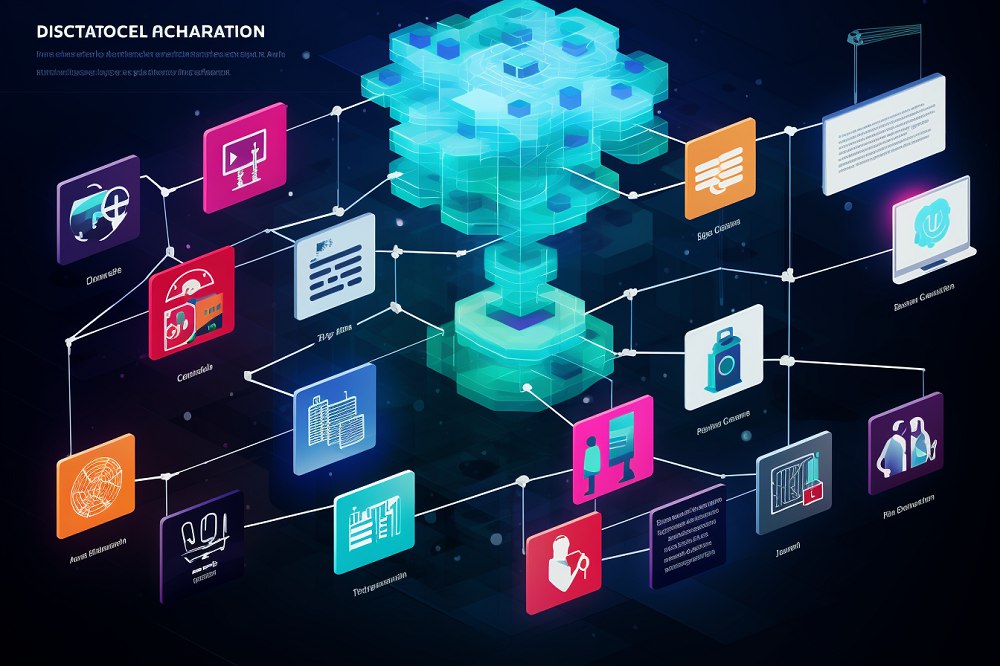Blockchain Application In Daily Healthcare Routine
Blockchain technology holds enormous promise for reinventing healthcare. Its transformative power stems from its ability to ensure transparent, unchanging, and secure record-keeping.
This advancement ushers in a new era of patient-centered care, allowing for rapid information exchange while strengthening data security across the healthcare landscape. The technology enables the creation of a decentralized ledger while protecting patient data privacy and allowing for controlled access.
It facilitates secure sharing among healthcare professionals by giving patients more control over their health information. Furthermore, blockchain can strengthen the integrity of clinical trials, ensure the veracity of results, and help drive medical research.
Smart contracts based on blockchain streamline insurance claim processes, significantly reducing errors and administrative burdens. Blockchain technology incorporation represents a significant step toward a more efficient and patient-friendly healthcare ecosystem.
Using Blockchain In Pharmaceutical Supply Chain
Blockchain technology revolutionizes pharmaceutical supply chains by expertly tracking drug movements from manufacturing to distribution. It generates an immutable ledger in which each process stage is documented as a separate block.
These blocks contain critical information such as quality certifications, production specifications, and shipping information. When combined with smart contracts, blockchain automates verification, ensuring that only authentic medications supported by validated records make their way through the supply chain.
Blockchain technology does not end with vigilance. By enabling real-time traceability and authentication, it promotes trust and transparency.
This dynamic system allows stakeholders to quickly identify and eliminate counterfeit drugs, protecting patient safety and confirming the authenticity of pharmaceuticals reaching consumers. The technology streamlines processes that save lives and ensures the integrity of pharmaceutical products in circulation.
Blockchain Technology In Telemedicine And Telehealth
A decentralized, secure ledger is the custodian of critical medical information, from prescriptions to treatment plans and patient records—all easily accessible in modern healthcare. This advancement streamlines virtual consultations by providing patients and healthcare professionals quick, secure access to the most up-to-date medical data.
Smart contracts automate appointment scheduling, ensuring accuracy while reducing scheduling clashes. Blockchain technology strengthens the patient-doctor relationship and protects sensitive data via encrypted, secure communication channels.
Furthermore, blockchain-based tokenization encourages patient participation in telehealth initiatives. This system could transform the landscape of virtual healthcare by rewarding data contributions or participation in research studies.
This transformation promotes a patient-centered approach to medical research and management, allowing individuals to shape and benefit from healthcare services actively.
Optimizing Medical Billing And Claim Processing Activities
Smart contracts transform payment settlements by executing transactions instantly if specific criteria are met, reducing processing times and administrative costs. Decentralized records simplify reconciliation, reducing differences between healthcare insurers.
Transparent, real-time data access has two benefits: it ensures regulatory compliance and speeds up audits. Immutable claim records enabled by blockchain improve fraud detection and invoicing precision.
The technology fundamentally improves healthcare financial operations’ efficiency, accuracy, and transparency. Its integration has enormous potential to reduce errors, accelerate processes, and create a dependable, auditable system.
This massive change could reshape medical billing and claims processing, paving the way for a more efficient and trustworthy approach.
Challenges Of Blockchain Implementation In Healthcare
Implementing blockchain in healthcare faces significant challenges, most notably interoperability issues. The combination of outdated healthcare systems and blockchain technology hinders the seamless transfer of patient data across platforms, impeding the development of a comprehensive healthcare record system.
Furthermore, the volume of healthcare data raises concerns about scalability. Blockchain’s decentralized nature can have performance issues when dealing with large datasets.
Privacy and regulatory compliance are also barriers to achieving broader blockchain implementation. Blockchain technology’s inherent transparency clashes with healthcare privacy regulations like the US’s Health Insurance Portability and Accountability Act (HIPAA).
This requires a delicate balance between patient confidentiality and data transparency. To ensure seamless operations, stakeholders must join hands to develop industry-wide standards and governance models for blockchain deployment.
Incorporating blockchain into healthcare requires overcoming interoperability, scalability, privacy, regulatory compliance, and collaborative governance barriers. Addressing these issues is critical if blockchain technology is to fully realize its potential for revolutionizing the healthcare landscape.
Future Of Blockchain Technology In Healthcare
Blockchain technology integration in the health sector could represent a transformative change in medical record-keeping. Smart contracts can automate administrative tasks, streamline processes significantly, and reduce errors.
Furthermore, blockchain’s transformative potential extends beyond record-keeping to research endeavors. It enables the secure exchange of sensitive data, promoting scientific progress while protecting patient confidentiality.
More importantly, patients will gain greater control over their health data as regulatory frameworks adapt to blockchain technology, fostering trust and transparency.
Conclusion
Blockchain integration will be a pillar of the future healthcare ecosystem. It will usher in a new era of efficiency, transparency, and a patient-centered approach, fundamentally changing how healthcare data is managed and accessed.
